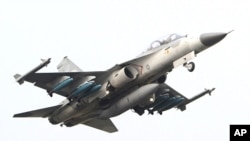The U.S. government rejected Taiwan’s request to buy 66 advanced F-16 fighter jets Wednesday, despite swift advances in the military power of its chief rival, China. Reaction in Taiwan to the long expected news was mixed but focused on what comes next.
Washington's decision to turn down Taiwan’s biggest military sales request in recent years was a disappointment in Taipei. Island officials say they need the later-model fighter jets to stand up to Beijing.
The alternative offer to upgrade Taiwan’s fleet of older U.S.-made F-16s - the bulk of a $5.85 billion arms package, was received as a short-term fix.
Taiwan’s defense ministry says it appreciates the upgrade offer, calling it 80 percent as good as a sale of the newer F-16s. It added that Taiwan would keep asking for newer jets, in the future.
Defense Minister Kao Hua-chu gave an upbeat assessment of the package, Thursday. He says the weapons deal is a major breakthrough for the Taiwan military.
The country's foreign minister says the program includes many advanced systems that Taiwan has wanted.
Raymond Wu, the managing director of Taipei-based political risk consultancy e-telligence in Taipei, says Taiwan will eventually need more air power to keep up with China.
“Given the facet that the PRC [Peoples Republic of China] has been building up its strength in recent years and the military balance across the Taiwan Strait has continued to tilt in China’s favor, I think the inability to acquire the more advanced F-16 C/Ds is a disappointment for Taiwan," he said.
Wu said the upgrade package will provide similar capabilities to new F-16s, meeting some of the military's immediate needs.
“But this is not a long-term solution because Taiwan in continuing cross-Strait exchanges with China needs to have a strong defense," Wu said.
Although Taiwan’s relations with China, just 160 kilometers away, have improved with trade talks since 2008, officials on the island worry that Beijing’s stance could change again. Both sides have braced for a fight since the 1940s, when Chiang Kai-shek’s Nationalists lost the Chinese civil war of the 1940s and fled to Taiwan. China’s Communists still claim sovereignty over self-ruled Taiwan today and have not renounced the threat of force.
Taiwan says it need needs more weaponry to keep up as Beijing spends 10 times more each year on its quickly modernizing military, considered ahead in terms of fire power. A senior U.S. diplomat for Taiwan has argued that a stronger defense also would give Taiwan more leverage when bargaining with China on non-military issues.
Taiwan’s news media played up the long expected lack of a new F-16 sale rather than the offer to retrofit 145 existing jets. Some local reports noted the government’s vow to keep shopping for better hardware, a plan with widespread public support.
As Taiwan President Ma Ying-jeou will seek re-election January 14, the defense ministry statement says his government has secured $18.3 billion in American military deals - a record high for the past three Taiwanese administrations. Leaders in Taipei are expected to re-launch their request for F-16 C/Ds, which they believe have better radars and more powerful weapons systems than the current A/Bs.
Taiwan Upbeat Despite US Decision Not to Sell Fighter Jet




